Increased value through sustainability
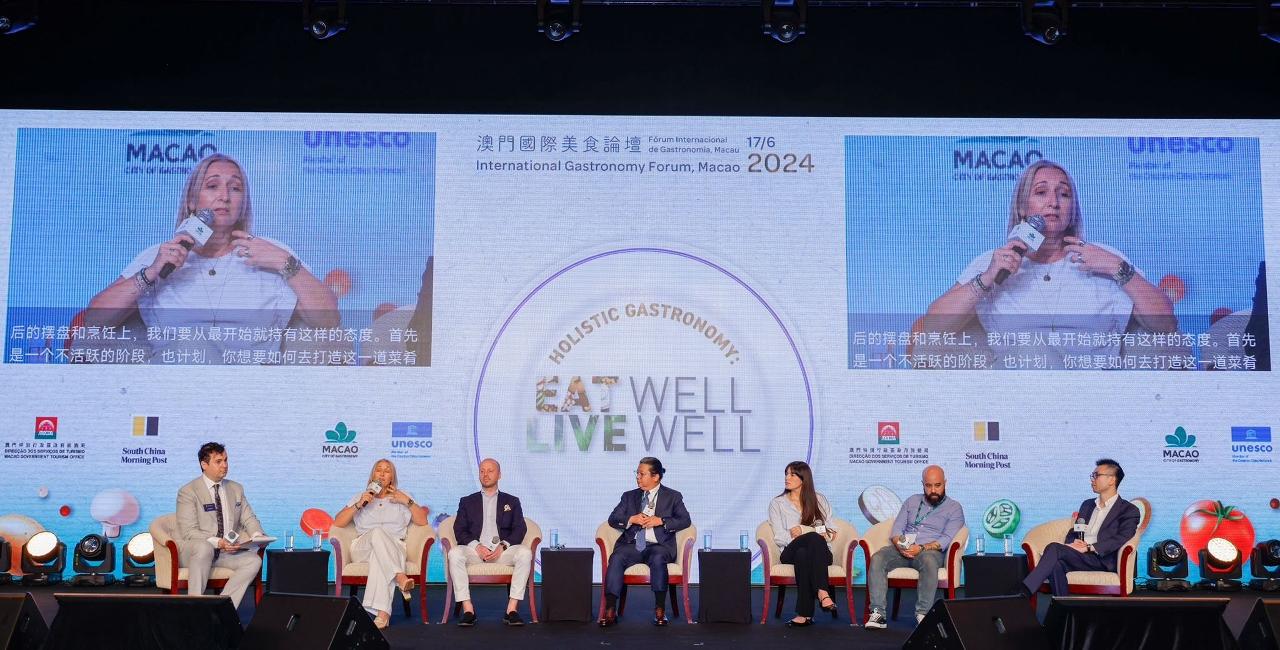
Professionals from the hospitality and leisure sectors discussed the importance of integrating health, culture and environmental protection in the hospitality industry at the International Gastronomy Forum in Macao on Monday. This event, held at Macau Fisherman’s Wharf, was part of the International Cities of Gastronomy Fest, Macao, and included collaborations with nearly 30 cities in the UNESCO Creative Cities Network.
The forum, with the theme “Holistic Gastronomy: Eat Well, Live Well”, highlighted the importance of an integrated and sustainable approach to gastronomy, stressing that the future of Macau’s tourism and culinary culture depends on conscious and innovative practices, at a time when tourist numbers in the city are once again reaching high numbers, with greater environmental and social impacts.
Maria Helena de Senna Fernandes, director of the Macau Government Tourism Office (MGTO), announced earlier this week that the city had received around 14 million tourists in the first five months of this year, with a daily average of 93,000 visitors. A few days later, the Minister of Economy and Finance pointed out that the Macau Special Administrative Region will reach 33 million tourists in 2024.
In 2023, the amount of municipal solid waste disposed of in Macau increased by 14.8 percent, with about a third of the total consisting of organic materials, according to the latest report from the Environmental Protection Agency.
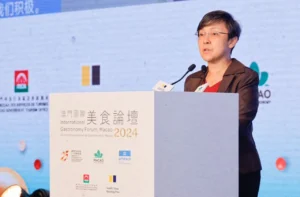
Maria Helena de Senna Fernandes, director of Macau Tourism Services (MGTO), announced earlier this week that the city had received around 14 million tourists in the first five months of the year.
An authentic gastronomic experience
Ruby O, Vice President of Sustainability and Business Synergies at MGM, spoke about the importance of diversifying Macau’s dining options. “Tourists who come to Macau are less concerned about well-being, but want to know what tastes good. We need to diversify the offering with healthy and quality food,” she said.
The sustainability expert stressed that the right approach is not to think about where tourists prefer to go, but where locals eat and what makes these local restaurants or food stalls attractive. “The food, the people and the history are what counts. Millennials and Generation Z want to know that when choosing a restaurant. We know there is a market, but we need to work together to develop our advantages and take a holistic approach to tourism in Macau,” she stressed.
More information about the International Cities of Gastronomy Fest, Macau
The MGM representative also felt that Hong Kong and Macau are part of the same tourism value chain. “Many international tourists who land in Hong Kong also have the impulse to want to buy local products, and many of them then travel to Macau. That is why Hong Kong and Macau are part of the same value chain,” she stressed. “How do we convince tourists to eat more local food? This has to be done from a safety and quality perspective, by making sure the products are high quality and by choosing ingredients that people know where they come from,” concluded Ruby O.
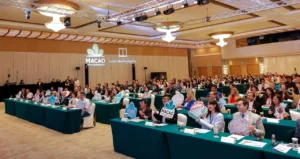
Professionals from the hospitality and leisure industry discussed the importance of integrating health, culture and environmental protection in the hospitality industry at the International Gastronomy Forum in Macao on June 17.
Andrew Tsui, co-founder of Rooftop Republic, a Hong Kong company that promotes urban farming, stressed the importance of using fresh and local ingredients to ensure an authentic and eco-friendly experience. “There is no point in buying pre-packaged ingredients from the other side of the world. If restaurants ensure that they only use local ingredients, we could guarantee that quality and experience while reducing emissions caused by imports.”
May Chow, chef and owner of Hong Kong restaurant Little Bao, explained that her restaurant is located in a city “where 98 percent of food is imported,” so she began looking for ways to promote local ingredients and ended up conveying the city’s culture through food.
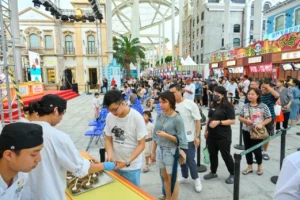
The International Gastronomy Promenade, another attraction of the event, features 100 Asian food stalls offering typical delicacies from different countries and regions. The venue has around 700 seats for meals, a games area and a bar area in the marina, as well as shows that enhance the festive atmosphere.
Mariana de Oliveira Dias, Executive Director of Health & Wellness at Sands China, spoke about the importance of educating customers about healthier and more sustainable food options. “Holistic gastronomy takes into account all elements of the gastronomic, wellness and health experience, including a focus on the use of unprocessed foods.” The wellness expert emphasized the need to offer healthier food options, such as plant-based foods, and how education about the environmental impact of food can lead to healthier choices.
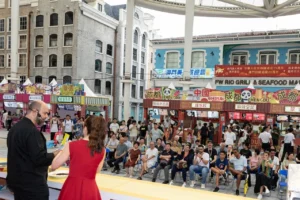
City of Gastronomy Demonstrations, one of the three highlights of the International Cities of Gastronomy Fest, Macao, will be presented by guest chefs representing 26 UNESCO Creative Cities of Gastronomy from around the world, including Asia, Europe, Africa, Oceania, South America and North America, at Fishermen’s Wharf in Macao until June 23.
“There are many ways to encourage customers to choose healthier alternatives. You can explain to them how the food is produced, what impact it has on the environment, how it was packaged, etc. You can offer them plant-based alternatives and their benefits. These are simple things that are important because they make sustainable alternatives accessible to everyone,” she stressed.
Maria Fátima Pun, Head of Sustainability at Wynn Palace and Wynn Macau, highlighted the use of technology to reduce food waste. “We need to measure the social and environmental impact of our activities. For example, we need to assess the food waste that is generated in abundance in Macau, and so we can use new technologies such as artificial intelligence to reduce this waste,” explained Pun.



